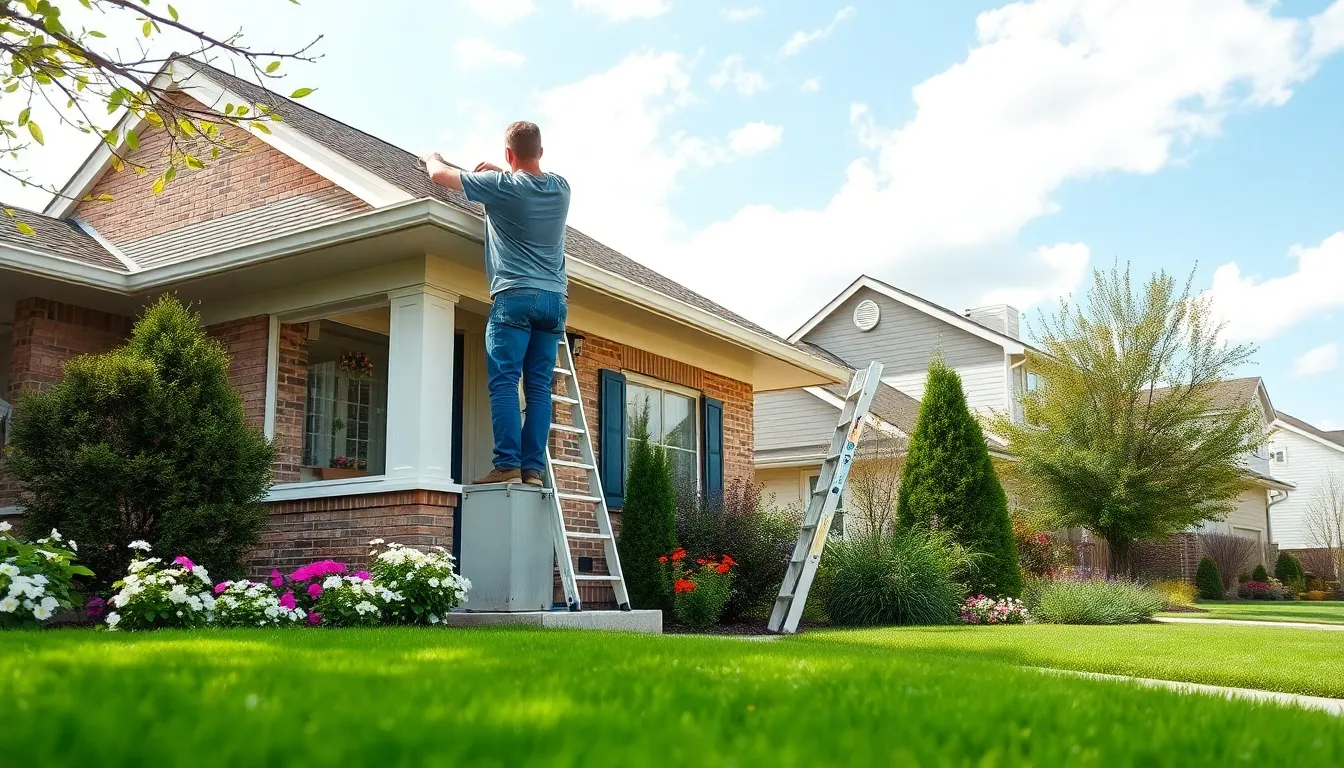Table of Contents
ToggleAs the seasons change, so do the demands on homes and gardens. It’s that time of year again when homeowners must don their superhero capes and tackle the essential task of seasonal maintenance. Ignoring these chores might seem tempting, but trust us, your future self will thank you when winter doesn’t turn your roof into a leaky sieve or summer doesn’t transform your lawn into a desert.
Understanding Seasonal Maintenance
Seasonal maintenance involves preparing homes and gardens for the changing climate. This practice prevents potential problems and preserves property value throughout the year.
Definition and Importance
Seasonal maintenance refers to routine tasks performed at specific times of the year to protect and maintain properties. These tasks include inspecting roofs before winter, cleaning gutters in fall, and preparing gardens for spring. Maintaining a schedule for these activities helps homeowners avoid costly repairs later. Recognizing the importance of these tasks promotes a safer, more efficient living environment.
Benefits of Seasonal Maintenance
Seasonal maintenance offers several advantages that enhance property longevity. First, it promotes early detection of issues, such as roof damage or plumbing leaks. Keeping systems in good working order reduces energy costs, thus saving money over time. Seasonal upkeep also increases curb appeal, making properties more inviting to guests and potential buyers. Furthermore, these proactive measures help ensure safety by preventing accidents caused by neglected areas, like icy walkways or overgrown gardens.
Spring Seasonal Maintenance


Spring represents a vital time for home and garden upkeep. Completing seasonal maintenance tasks ensures properties stay in optimal condition.
Roof and Gutter Inspection
Inspect roofs for damage after winter’s harsh conditions. Look for cracked shingles, leaks, or loose flashing to prevent future water damage. Clean gutters of debris to ensure proper drainage during spring storms. Clogged gutters can lead to basement flooding or foundation issues. Conducting these checks early reduces the risk of costly repairs later.
Lawn Care and Gardening
Focus on lawn care as temperatures rise. Reseed any bare patches for a lush green appearance. Begin fertilization to promote healthy growth. Trim shrubs and trees to encourage new foliage and improve air circulation. Prepare flower beds by clearing weeds and adding mulch to enhance soil health. These actions boost curb appeal and set the stage for a vibrant garden throughout the summer months.
Summer Seasonal Maintenance
Summer maintenance tasks become essential for ensuring home and garden functionality. Proper upkeep during this season prevents issues and promotes a comfortable living environment.
HVAC System Checks
Regular HVAC system checks enhance cooling efficiency. Technicians should inspect air conditioning units for refrigerant levels and cleanliness. Filters require replacement every one to three months. Scheduling maintenance before peak summer months ensures optimal performance and extends the lifespan of the system. Additionally, checking for air leaks around windows and doors reduces energy costs.
Pool and Patio Preparation
Preparing pools and patios ensures enjoyment during warm weather. Cleaning the pool and checking for chemical levels maintain water quality. Inspecting pool equipment for wear guarantees safety and functionality. Patios benefit from cleaning and resealing pavers to prevent damage from sun exposure. Arranging outdoor furniture enhances comfort and aesthetic appeal. Social gatherings become more enjoyable with a well-maintained patio space ready for summer activities.
Fall Seasonal Maintenance
Fall maintenance tasks play a vital role in preparing homes for winter conditions. Focusing on heating systems and outdoor equipment ensures optimal function and durability.
Heating System Preparation
Inspecting heating systems takes precedence as cooler temperatures approach. Homeowners should replace filters and schedule professional inspections to enhance efficiency. Checking for leaks around ducts also prevents energy loss. Testing thermostats ensures accurate temperature regulation, contributing to consistent warmth throughout the home. Bleeding radiators eliminates trapped air, ensuring optimal heat distribution. Finally, ensure chimneys and flues remain clear for safe operation of wood-burning stoves or fireplaces.
Winterizing Outdoor Equipment
Preparing outdoor equipment for winter prevents damage during freezing temperatures. First, drain and store hoses to avoid cracks. It’s essential to clean and store lawn mowers to prevent rust and corrosion. Additionally, winterize pools by checking chemical levels and covering them with durable covers. Inspecting garden furniture for any necessary repairs and storing cushions indoors protects them from harsh weather. Finally, checking snow equipment, such as shovels and blowers, ensures readiness for the snow ahead.
Winter Seasonal Maintenance
Winter maintenance tasks protect homes from harsh weather. Homeowners must prepare to ensure comfort and safety.
Insulation and Draft Proofing
Insulation plays a critical role in regulating home temperature. Inspecting areas such as attics and basements ensures adequate insulating materials are in place. Sealing gaps around windows and doors eliminates drafts that can decrease heating efficiency. Homeowners should prioritize applying weatherstripping and caulking to prevent cold air infiltration. Checking for insulation performance in walls and attics also enhances overall energy efficiency. Properties with optimal insulation experience lower heating bills and more consistent temperatures during the winter months.
Emergency Preparedness
Preparing for potential winter emergencies is vital for homeowners. Create an emergency kit containing essential items like flashlights, batteries, bottled water, and non-perishable food. Maintaining a list of emergency contacts, including local utility companies, serves useful during power outages. Checking smoke detectors and carbon monoxide alarms ensures they function properly throughout the season. Storing extra blankets and warm clothing offers additional comfort during unanticipated cold spells. Regularly reviewing and updating emergency plans ensures readiness for winter storms or other unexpected events.







